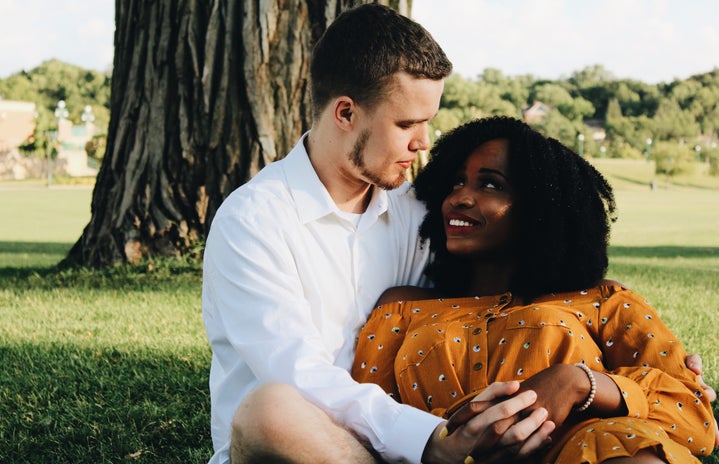Love. What an exquisite and divine word that holds so much meaning, and a variation of interpretations. Feelings of love are one of the most unique and sought after intangible things anyone could ever wish for. Love brings fulfillment, joy, lust, pain, dread and more. How could one feeling be so powerful?
As we enter into what many millennials refer to as “cuffing season,” it seems like a big chunk of people are looking forward to the holiday season since it will be filled with so much love, especially the love they share with their significant other, whether short-term or long-term. Winter brings upon feelings of longing for some sort of connection to fix the loneliness the colder months bring to many. Having a partner during your college years is definitely something unique. People are still finding themselves and discovering their passions in life and what career they wish to pursue. They are also figuring out what they value in a romantic and/or physical relationship with a potential partner. They may not even know what they want. This can be tricky! I know I don’t stand alone when I admit I have scoured YouTube, Google, and even a handful of self-help books and diverse articles over the years to help me solve various incidences I was presented with that I just didn’t know how to approach. Learning how to immediately spot red flags, coercive behaviors, manipulation, or really anything that you know you won’t be compatible with is a vital skill in the world of dating. The Five Love Languages describe the way we feel love and are appreciated. This varies based on personality type, which is perfectly normal. Knowing your love language could surely benefit you and your partner in understanding the way the other feels love best, and will definitely help you in fulfilling your partner’s emotional needs and expectations. Understanding your partner’s best way to receive love will also help strengthen your relationship.
What are the five love languages and what do they mean?
The Five Love Languages, a book written by Gary Chapman in 1995, has since gained extreme popularity in the literature and research of dating habits, behaviors, wants, and needs. According to Gary, the languages are: Words of Affirmation, Acts of Service, Receiving Gifts, Quality Time, and Physical Touch.
- Words of Affirmation
-
Simply put, this person loves words. They really enjoy being complimented and feel loved when their achievements are recognized and admired. If you have a partner with this love language, don’t forget to consistently tell them how much you care for them, even if you think they know it already and don’t need to be reminded. But keep it genuine. Feel the feelings of the words, and only say what you mean. Words that lack feeling won’t satisfy this type of partner.
Also, this person may feel extra offended by words that hurt.
- Acts of Service
-
This person may live through the mantra, “actions speak louder than words.” This person feels the love when it’s put into action. Doing the dishes, mowing the lawn, putting the kids to bed and so on, for example. These acts can be defined as anything that will make their partner’s life easier or help them to feel appreciated and respected. The most meaningful acts are those that are “invisible.” Maybe your partner does the dishes although it’s your turn, because he knows you are stressed out studying for an exam, and really don’t have the time to set aside to wash a sink full of dishes. Your partner didn’t mention that he did you a favor, because then it may seem like he wants a favor in return, or is trying to prove he cares about you. It can be a small act that exists as a special gesture to your partner.
- Receiving Gifts
-
This person feels the love when they receive gifts. It could be flowers, chocolates, a needed household item, a cup of coffee, or a little treat from their favorite bakery. These gifts may help the partner with this love language feel noticed and appreciated, and it will most likely brighten their day. It extends to feeling cared for, and helps build a reliance on partners, allowing them to know their partner will always do whatever they can to make them feel better. Remember, it is not about purchasing high quality items or materialistic things. It’s about the thoughtfulness behind these items, and trying to give your partner something you know they will benefit from and truly enjoy.
- Quality Time
-
If this is your partner’s love language, it means they feel the most loved when they spend time with you. Sitting in each others presence while scrolling through social media is just not going to cut it. Put away the phone! Actually talking about something substantial, maintaining individual attention and eye contact, and remaining present in the moment is a great way to achieve successful one-on-one time with your partner. Dedicate a date and pre-plan what you will do with your partner. This partner will appreciate the thoughtfulness of your idea, and will feel that they are important to you and a valuable part of their life. Finally, be affectionate and show them love. Remind your partner how special they are to you!
- Physical Touch
-
This love language does not center around sex. It focuses more on feelings of intimacy. Holding hands, back rubs, hugs, cuddles, eskimo kisses, and more. You get the idea. Some people who have physical touch as their love language require a little bit more of it, and that is perfectly okay. Physicality is an essential part of a romantic relationship, and should definitely be apart of the conversation.
We all express and receive love in different ways, and it is helpful to understand our own and our partner’s love language, especially when it is not the same as ours.
What’s yours? Take the quiz to find out.
Sending you the best of luck with figuring out love!
Xo, Susie


